|
Upcoming Events
International Conference on Asian Food Security (ICAFS)
'Feeding Asia in the 21st Century: Building Urban-Rural Alliances'
RSIS Centre for Non-Traditional Security (NTS) Studies
10 to 12 August 2011
Singapore
 The first International Conference on Asian Food Security (ICAFS) will be held in Singapore from 10 to 12 August 2011. ICAFS is organised collaboratively by the Centre for Non-Traditional Security (NTS) Studies and the Philippines-based Southeast Asian Regional Center for Graduate Study and Research in Agriculture (SEARCA). The Conference, themed 'Feeding Asia in the 21st Century: Building Urban – Rural Alliances', will bring together key public, private and civil society players in food security to analyse, discuss and chart directions for the four basic dimensions of food security: availability, physical access, economic access and utilization. The first International Conference on Asian Food Security (ICAFS) will be held in Singapore from 10 to 12 August 2011. ICAFS is organised collaboratively by the Centre for Non-Traditional Security (NTS) Studies and the Philippines-based Southeast Asian Regional Center for Graduate Study and Research in Agriculture (SEARCA). The Conference, themed 'Feeding Asia in the 21st Century: Building Urban – Rural Alliances', will bring together key public, private and civil society players in food security to analyse, discuss and chart directions for the four basic dimensions of food security: availability, physical access, economic access and utilization.
2nd Shonar Manush Shommanona and Remittance Utshob 2011
Refugee and Migratory Movements Research Unit (RMMRU)
19 October 2011
Dhaka, Bangladesh
In 2009, RMMRU organized the Remittance Utshob (festival) to highlight and honour the contribution of remitters and remittance users in the national economy. Migrant workers and their families as well as grassroots officials were conferred awards for their efforts and dedication to the sector.
With the success of the 2009 event, RMMRU has taken the initiative to organise the 2nd Shonar Manush Shommanona and Remittance Utshob 2011. RMMRU intends to achieve the following objectives: (1) to request the Chief Guest to lobby the Prime Minister of Bangladesh to declare 2012-2021 as the Migration Decade; (2) to allocate a greater budget for establishing good governance in migration issues; and (3) to persuade the government to identify migrants’ remittances as a major source for capital formation.
For more information on the event, please visit the RMMRU website.
^ To the top
Announcements
Results of NTS-Asia Research Fellowship 2011
As with previous years, the quantity and quality of the applicants for the NTS-Asia Research Fellowship has been increasing. NTS-Asia is pleased to award this year’s fellowship to the following three scholars – Aries A. Arugay, Christopher Baker and Sheena Kumari. Below are the brief bios of the 2011 NTS-Asia Fellows.
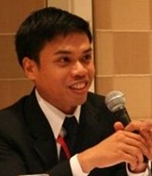 Aries A. Arugay is currently pursuing a PhD in political science at Georgia State University under a Fulbright scholarship. He is also an assistant professor at the University of the Philippines in Diliman. He holds an MA in political science. His research focuses on comparative democratization, security sector governance, civil-military relations, and contentious politics. He has written about political accountability, security sector reform, civil society, and democratic quality in the Philippines. The latest is a chapter about Philippine civil-military relations in the edited volume The Political Resurgence of the Military in Southeast Asia (Routledge). Aries A. Arugay is currently pursuing a PhD in political science at Georgia State University under a Fulbright scholarship. He is also an assistant professor at the University of the Philippines in Diliman. He holds an MA in political science. His research focuses on comparative democratization, security sector governance, civil-military relations, and contentious politics. He has written about political accountability, security sector reform, civil society, and democratic quality in the Philippines. The latest is a chapter about Philippine civil-military relations in the edited volume The Political Resurgence of the Military in Southeast Asia (Routledge).
Mr Arugay’s NTS-Asia research will be a comparative study of the impact of military initiatives for development in local communities on non-traditional security in the Philippines and Thailand. He will be based at the Institute for Strategic and Development Studies, Inc. (ISDS Philippines) during the 3-month fellowship.
 Christopher Baker is a Research Analyst at the Centre for International Security Studies at the University of Sydney and is a member of the Food Security in Asia project sponsored by the MacArthur Foundation. He teaches International Relations and Globalisation and is completing his PhD on the topic of environment and conflict in Asia. Chris' main research interest is the linkages between environmental scarcities and violent conflict. Christopher Baker is a Research Analyst at the Centre for International Security Studies at the University of Sydney and is a member of the Food Security in Asia project sponsored by the MacArthur Foundation. He teaches International Relations and Globalisation and is completing his PhD on the topic of environment and conflict in Asia. Chris' main research interest is the linkages between environmental scarcities and violent conflict.
The topic of research for the NTS Fellowship is: “Livelihoods and dams in the Mekong River Basin: Dams at the nexus of food, water, environmental and human security”. The research will be conducted at the Centre for International Security Studies, University of Sydney, and the Institute of World Economics in Vietnam.
 Sheena Kumari is currently a MA student in History at the National University of Singapore. Her research interests include interdisciplinary approaches towards the study of gender and women’s history, post-colonialism, intellectual and cultural history, theories of travel, literature and narrative studies. Her area of focus includes the history of Southeast Asia and South Asia and British imperial history. Sheena Kumari is currently a MA student in History at the National University of Singapore. Her research interests include interdisciplinary approaches towards the study of gender and women’s history, post-colonialism, intellectual and cultural history, theories of travel, literature and narrative studies. Her area of focus includes the history of Southeast Asia and South Asia and British imperial history.
Her NTS-Asia research project, “Emotional Geographies: Burmese Refugee Women and the Gendered Politics of Exile, Reconstruction and Human Rights”, draws upon global feminist scholarship, women’s activism, refugee studies and the intersections between gender, human rights, nationhood and displacement. She will be conducting her fellowship at Women in Security, Conflict Management and Peace (WISCOMP), Foundation for Universal Responsibility in India.
For a list of past NTS-Asia Research Fellows, please click here.
Launch of GPPAC South Asia Website in August
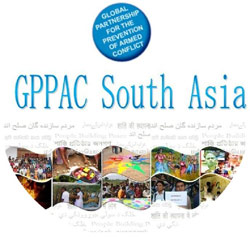 The Regional Centre for Strategic Studies (RCSS) will be launching the GPPAC (Global Partnership for the Prevention of Armed Conflict) South Asia website on 1 August 2011. The website is hosted on the Peace Portal and offers information about the regional network’s work in the fields of peacebuilding and conflict transformation, activities of its members and other regional developments. It is also envisioned that the website will strengthen the connectivity between the civil society organisations (CSOs) working in the region. The GPPAC South Asia website was created with the support of the GPPAC Peace Portal and is maintained by the Regional Centre for Strategic Studies (RCSS), which is the Regional Secretariat for GPPAC South Asia. The Regional Centre for Strategic Studies (RCSS) will be launching the GPPAC (Global Partnership for the Prevention of Armed Conflict) South Asia website on 1 August 2011. The website is hosted on the Peace Portal and offers information about the regional network’s work in the fields of peacebuilding and conflict transformation, activities of its members and other regional developments. It is also envisioned that the website will strengthen the connectivity between the civil society organisations (CSOs) working in the region. The GPPAC South Asia website was created with the support of the GPPAC Peace Portal and is maintained by the Regional Centre for Strategic Studies (RCSS), which is the Regional Secretariat for GPPAC South Asia.
Click here to visit the GPPAC South Asia website.
New Appointments
 The Regional Centre for Strategic Studies (RCSS) in Colombo welcomes Ms. Suranthi Boange. She joined the institute as a Programme Officer in May 2011. Prior to this appointment, Ms. Boange was a Project Assistant in the UNDP Support to Mine Action Project. Ms. Boange had also worked at the Bandaranaike Centre for International Studies (BCIS) as an Assistant Editor cum Information Officer. She received her Bachelor of Business Administration degree from the Institute of Technological Studies in Sri Lanka and MA in Communication Studies from the University of South Dakota in the United States. Ms. Boange can be contacted at programmes@rcss.org The Regional Centre for Strategic Studies (RCSS) in Colombo welcomes Ms. Suranthi Boange. She joined the institute as a Programme Officer in May 2011. Prior to this appointment, Ms. Boange was a Project Assistant in the UNDP Support to Mine Action Project. Ms. Boange had also worked at the Bandaranaike Centre for International Studies (BCIS) as an Assistant Editor cum Information Officer. She received her Bachelor of Business Administration degree from the Institute of Technological Studies in Sri Lanka and MA in Communication Studies from the University of South Dakota in the United States. Ms. Boange can be contacted at programmes@rcss.org
 The Centre for the Study of Developing Societies (CSDS), New Delhi, has noted that Dr Sandeep Shastri, Pro Vice-Chancellor of Jain University in Bangalore, has been engaged to draft the constitution for the newly established state of South Sudan. On behalf of NTS-Asia, we would like to extend our best wishes to Dr Shastri. Please click here for a write-up on Dr Shastri’s new appointment in the Times of India. The Centre for the Study of Developing Societies (CSDS), New Delhi, has noted that Dr Sandeep Shastri, Pro Vice-Chancellor of Jain University in Bangalore, has been engaged to draft the constitution for the newly established state of South Sudan. On behalf of NTS-Asia, we would like to extend our best wishes to Dr Shastri. Please click here for a write-up on Dr Shastri’s new appointment in the Times of India.
BIPSS signs MoU with Coventry University Higher Education Corporation
The Bangladesh Institute of Peace and Security Studies (BIPSS) and the Coventry University Higher Education Corporation have signed a ‘Memorandum of Understanding’ (MoU) for an enhanced partnership between the two institutes. The MoU was signed by Major General Muniruzzaman, President of BIPSS and Professor David Pilsbury, Pro Vice-Chancellor of Coventry University Higher Education Corporation at Coventry University in the United Kingdom on 1st July 2011. The MoU seeks to establish a working relationship between the two institutes in the area of peace and security studies as well as disaster management and resilience. |
^ To the top
Recent Events
BIPSS Roundtable on “Afghanistan - The Challenges of Making Peace and Implications for South Asia” and Young Strategists Forum
Bangladesh Institute for Peace and Security Studies (BIPSS)
27 July 2011, Dhaka
 BIPSS recently organised a Roundtable on “Afghanistan - The Challenges of Making Peace and Implications for South Asia” on 27 July 2011 at CIRDAP Auditorium, Dhaka. Dr Greg Mills, Director of The Brenthurst Foundation, South Africa and Former Special Advisor to the Commander of NATO Forces in Afghanistan, delivered the keynote address. The Roundtable was chaired by BIPSS President Major General Muniruzzaman. BIPSS recently organised a Roundtable on “Afghanistan - The Challenges of Making Peace and Implications for South Asia” on 27 July 2011 at CIRDAP Auditorium, Dhaka. Dr Greg Mills, Director of The Brenthurst Foundation, South Africa and Former Special Advisor to the Commander of NATO Forces in Afghanistan, delivered the keynote address. The Roundtable was chaired by BIPSS President Major General Muniruzzaman.
In addition to this, BIPSS hosted a Young Strategist Forum at the BIPSS Office Auditorium, Dhaka. The Forum brought together young scholars on strategic studies to share their thoughts on pertinent security issues as well as learn from Dr Greg Mills, who shared his perspectives on strategic affairs.
Pilot Workshop on 'Governing Geoengineering in the 21st Century: Asian Perspectives'
RSIS Centre for NTS Studies
18–19 July 2011, Singapore
 The RSIS Centre for NTS Studies, in cooperation with the Oxford Geoengineering Programme – an initiative of the Oxford Martin School at the University of Oxford – and the Solar Radiation Management Governance Initiative (SRMGI) – an international NGO project co-convened by The Royal Society (UK), Environmental Defense Fund (US), and TWAS (The Academy of Sciences for the Developing World) – convened a pilot workshop on geoengineering governance at Nanyang Technological University in Singapore on 18–19 July 2011. The RSIS Centre for NTS Studies, in cooperation with the Oxford Geoengineering Programme – an initiative of the Oxford Martin School at the University of Oxford – and the Solar Radiation Management Governance Initiative (SRMGI) – an international NGO project co-convened by The Royal Society (UK), Environmental Defense Fund (US), and TWAS (The Academy of Sciences for the Developing World) – convened a pilot workshop on geoengineering governance at Nanyang Technological University in Singapore on 18–19 July 2011.
The meeting explored how geoengineering – the deliberate large-scale intervention in the Earth's natural systems to counteract climate change – is framed in Asia and the governance issues associated with any such research, potential development and deployment. The workshop brought together academics, policymakers and civil society stakeholders from across the region to participate in the debate. A video conference was also conducted with speakers based in the UK. The pilot workshop was the first of several such meetings to broaden the discourse on geoengineering, which has thus far been largely confined to Europe and North America.
Talk on “India and Bangladesh: Partners in Progress”
by Mr. S.M. Krishna, External Affairs Minister, Republic of India
Bangladesh Institute for International and Security Studies (BIISS)
8 July 2011
Dhaka, Bangladesh
 Mr. S. M. Krishna, External Affairs Minister of the Republic of India delivered a talk on “India and Bangladesh: Partners in Progress” on 8 July 2011 at the BIISS Auditorium. Attendees at the talk included Dr Dipu Moni, Minister for Foreign Affairs, Government of the People’s Republic of Bangladesh, Mr Muhammad Mijarul Quayes, Foreign Secretary, Ministry of Foreign Affairs, Mr Rajeet Mitter, High Commissioner of India to Bangladesh and Mr Ahmad Tariq Karim, High Commissioner of Bangladesh to India. Major General Muhammad Imrul Quayes (ndc, psc), Director General, BIISS delivered the Welcome Address. The session was chaired by Major General Muhammad Firdaus Mian (psc), Chairman, Board of Governors, BIISS. Mr. S. M. Krishna, External Affairs Minister of the Republic of India delivered a talk on “India and Bangladesh: Partners in Progress” on 8 July 2011 at the BIISS Auditorium. Attendees at the talk included Dr Dipu Moni, Minister for Foreign Affairs, Government of the People’s Republic of Bangladesh, Mr Muhammad Mijarul Quayes, Foreign Secretary, Ministry of Foreign Affairs, Mr Rajeet Mitter, High Commissioner of India to Bangladesh and Mr Ahmad Tariq Karim, High Commissioner of Bangladesh to India. Major General Muhammad Imrul Quayes (ndc, psc), Director General, BIISS delivered the Welcome Address. The session was chaired by Major General Muhammad Firdaus Mian (psc), Chairman, Board of Governors, BIISS.
Roundtable on “The Current Science and Technology Landscape of Climate Change and Environmental Security in the
Asia Pacific Region”
Bangladesh Institute for Peace and Security Studies (BIPSS)
20 June 2011
Dhaka, Bangladesh
BIPSS held a Roundtable on “The Current Science and Technology Landscape of Climate Change and Environmental Security in the Asia Pacific Region” on 20 June 2011 at the Conference Room of Flambé Restaurant, Dhaka. Dr. J. Scott Hauger, Associate Professor of the Asia-Pacific Center for Security Studies (APCSS), delivered the keynote address on the theme. In his presentation, he highlighted the science behind global warming and climate change, and the environmental impacts and security implications of climate change for the Asia-Pacific region. He concluded that climate change is prevalent and over the next 25 years, we will have to deal with the greater incidence of natural calamities, reduced water supply and food production and possible increase in disease and climate induced migration in the region. The Roundtable was chaired by BIPSS President Major General Muniruzzaman (retd.).
Visitors at Centre for Non-Traditional Security and Peaceful Development Studies (NTS-PD)
NTS-PD, Zhejiang University
17 -19 June 2011
Zhejiang, China
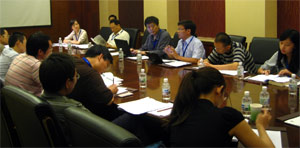 |
| Dr Shen (in light blue shirt) delivering a lecture at Centre for NTS-PD Studies |
Dr. Ce Shen, Professor at the Graduate School of Social Work, Boston College, visited NTS-PD at Zhejiang University from 17-19 June 2011. Dr Shen delivered two lectures on the “Economic status of the aged and future of retirement security in the US” and “The effects of inequality on the well-being of a society and its people — an international perspective”.
Roundtable Discussion with H. E. Ahmed Naseem, Minister of Foreign Affairs, Republic of Maldives.
Bangladesh Institute for International and Security Studies (BIISS)
29 May 2011
Dhaka, Bangladesh
 An eight-member delegation from the Republic of Maldives led by H. E. Ahmed Naseem, Minister of Foreign Affairs visited BIISS on 29 May 2011. The other members of the delegation were high-level officials from the Ministry of Foreign Affairs and prominent businesspersons in the Maldives. They were accompanied by H. E. Ahmed Sareer, High Commissioner of the Maldives to Bangladesh. The delegation participated in a Roundtable discussion held in the institute’s auditorium. Major General Muhammad Imrul Quayes, Director General of BIISS, delivered the welcome remarks at the Roundtable session while Major General Muhammed Firdaus Mian, Chairman, Board of Governors, BIISS chaired the session. Dr. Shaheen Afroze, Research Director in BIISS, delivered a presentation on the aims, objectives, organizational structure and activities of BIISS. H. E. Ahmed Naseem, Minister of Foreign Affairs of the Maldives provided an overview of the current political situation and democratic reform process in the Maldives. This was followed by an exchange of views between the visiting delegates and the faculty members on the various issues of interest. An eight-member delegation from the Republic of Maldives led by H. E. Ahmed Naseem, Minister of Foreign Affairs visited BIISS on 29 May 2011. The other members of the delegation were high-level officials from the Ministry of Foreign Affairs and prominent businesspersons in the Maldives. They were accompanied by H. E. Ahmed Sareer, High Commissioner of the Maldives to Bangladesh. The delegation participated in a Roundtable discussion held in the institute’s auditorium. Major General Muhammad Imrul Quayes, Director General of BIISS, delivered the welcome remarks at the Roundtable session while Major General Muhammed Firdaus Mian, Chairman, Board of Governors, BIISS chaired the session. Dr. Shaheen Afroze, Research Director in BIISS, delivered a presentation on the aims, objectives, organizational structure and activities of BIISS. H. E. Ahmed Naseem, Minister of Foreign Affairs of the Maldives provided an overview of the current political situation and democratic reform process in the Maldives. This was followed by an exchange of views between the visiting delegates and the faculty members on the various issues of interest.
Presentations delivered by Representatives of NTS-Asia Network Member Institutes
In recent months, several members in the NTS-Asia network participated in international conferences and delivered presentations relating to NTS issues. Others have hosted visiting delegations in their institutes and briefed visitors on NTS issues. This section highlights some of these events:-
Network of East Asian Think Tanks (NEAT) Working Group on Disaster Management Meeting
18 July 2011, Beijing
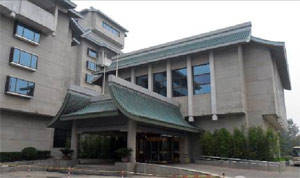 |
| Venue of the NEAT Working Group on Disaster Management in Beijing – Diaoyutai Hotel |
Ms. Sofiah Jamil, Associate Research Fellow at the RSIS Centre for NTS Studies, participated in the NEAT Working Group on Disaster Management Meeting, which was organized by the China Foreign Affairs University. The NEAT Working Group on Disaster Management sought to explore ways in which ASEAN Plus Three countries could work effectively with one another when natural disasters strike, means of enhancing regional capability and institutional capacity of disaster management, and what multilateral institutions East Asian countries can develop to effectively maintain economic dynamism while managing the increasing frequency and intensity of natural disasters. The meeting covered 3 themes – (1) Disaster management in East Asia: experiences and lessons; (2) Regional coordination of disaster management: mechanisms and practices; and (3) Policy recommendations: disaster management and community building. Ms Jamil delivered a presentation on the topic of “Sustaining Community Resilience and Development in Times of Disasters”. As the Track 2 mechanism for the ASEAN Plus Three process, discussions and points raised during this NEAT working group meeting would be consolidated and submitted to the NEAT Annual Conference in late August 2011.
Academic Community Conference on Political Science and International Relations
9-10 July 2011, Beijing
Prof. Xiaofeng Yu, Director of NTS-PD, participated in the conference on 9-10 July 2011 in Beijing. Prof. Yu presided over a session on “Non-traditional security and public crisis management”. During this panel, conference participants highlighted and discussed several issues including food safety, civil defense and security and international crisis management.
Workshop on “Common Grounds: Ways to Regional Cooperation in South Asia”
3-5 July 2011, Berlin
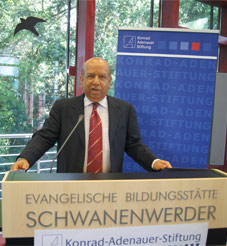 |
| Major General Muniruzzaman at the workshop on "Common Grounds: Ways to Regional Cooperation in South Asia". |
Major General Muniruzzaman was invited by Konrad-Adenauer-Foundation to attend and speak at this workshop held on 3-5 July 2011 in Berlin, Germany. During the conference, General Muniruzzaman spoke on the theme of “Climate Change and Environmental Degradation as Threats to National and Regional Stability: Common grounds for regional cooperation on crisis response and early warning systems?”. During his presentation, he highlighted the major national and regional vulnerabilities of South Asia to climate change and cited Bangladesh as a case study. He also explored the possibilities of regional cooperation mechanisms among the South Asian countries in the coming years.
Visiting Delegations to BIPSS
Major General Muniruzzaman delivered a presentation on “Climate Security and its consequences for Bangladesh” during his interactions with a visiting delegation from the US National Defence University. The presentation analysed the security challenges posed by Climate Change and discussed the implications for South Asia. Major General Muniruzzaman also delivered a presentation on ”Bangladesh’s National Strategy for Adaptation to Climate Change” for a visiting delegation from the Royal College of Defence Studies, London.
Pacific Environmental Security Conference in Hawaii, USA
At this conference, Major General Muniruzzaman delivered a presentation on “Security Implications of Climate Change: Role of the Military”, in which he highlighted human security as well as traditional security dimensions of climate change. The presentation touched on issues relating to social fragmentation, resource competition, intra and inter-state conflict, state collapse and the possibility of regional conflicts as a result of the effects of climate change. Major General Muniruzzaman, who is also a member of the International Military Advisory Council (IMAC) on Climate Change and Security, also noted BIPSS’ extensive engagement and research on various aspects of security implications of climate change.
MacArthur Foundation Asia Security Initiative (ASI) Annual Meeting
10-12 June 2011, Beijing
The MacArthur Foundation Asia Security Initiative (ASI) Annual Meeting held on 10-12 June 2011 in Beijing was hosted by School of International Studies and the Centre for International and Strategic Studies at Peking University. Themed “Rising Powers and the World Order”, the meeting brought together member institutes of the 3 clusters of the MacArthur Asia Security Initiative, which BIPSS, the RSIS Centre for NTS Studies and the CISS University of Sydney are part of.
Visit by Representative of the Australian Embassy in Beijing to IAPS, CASS
Prof Han Feng, Deputy Director of the Institute of Asia-Pacific Studies (IAPS) at the Chinese Academy of Social Sciences (CASS) met with Mr. Robert Fergusson, Political Counsellor, Australian High Commission in Beijing on 10 May 2011. The discussion during the meeting was primarily on bilateral relations between China and Australia, and Australian Prime Minister Julia Gillard’s recent visit to China.
^ To the top
Recent Publications
Mattering to India, The Shashi Tharoor Campaign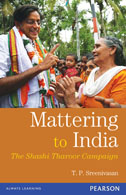
T.P. Sreenivasan, Pearson, 2011
Research by Sanjay Kumar from CSDS, India has been cited in this book -- ‘An Analysis of Result of Thiruvananthapuram Lok Sabha Constituency, Lok Sabha elections 2009’.
|
|
PKS in Post-Reformasi Indonesia: Outlook, Challenges, and Trajectory
Centre for Strategic and International Studies, Jakarta
Sunny Tanuwidjaja, Working Paper, 2011
This paper was presented in a Workshop on "Dynamics of Political Parties and Party System in Post-Reformasi Indonesia: Outlook, Challenges, and Future Trajectory" organized by the S. Rajaratnam School of International Studies in April 2010. The paper will be further refined and is set to be published in the South East Asia Research Journal in 2012. |
|
Poverty in a Chinese Community in West Java, Indonesia: Survival, Identity, Social Face
 Centre for Strategic and International Studies, Jakarta
Centre for Strategic and International Studies, Jakarta
Vidhyandika Djati Perkasa, 2011
LAP Lambert Academic Publishing
This book examines the poverty and survival strategies of a poor Chinese community in the village of Mulyaasih, West Java, Indonesia.
|
|
The Center for Non-Traditional Security & Peaceful Development (NTS-PD), Zhejiang University, published two books under its "Non-Traditional Security in the Contemporary World" series: |
|
 The Politics of Global Health Governance: United by Contagion The Politics of Global Health Governance: United by Contagion
Mark W. Zacher and Tania J. Keefe
Translated by Jiyong Jin
Zhejiang University Press, 2011
|
|
 Human Security and the UN: A Critical History Human Security and the UN: A Critical History
S. Neil MacFarlane, Yuen Foong Khong
Translated by Yan Zhang
Zhejiang University Press, 2011
|
|
Hukou System Reform and Unification of Rural–Urban Social Welfare
 Institute of World Economics and Politics (IWEP)
Institute of World Economics and Politics (IWEP)
Fang Cai, China & World Economy, Vol. 19, No. 3, pp. 33–48, 2011
Using a political economy analytical framework, the present paper examines the hukou system reform in China. The potential unification of the social welfare system of rural and urban areas is discussed. The paper reviews the progress of the hukou system reform since 2004. It is suggested that since China met its Lewis turning point around 2004, and a labor shortage became a limiting factor in production, there has been stronger demand for hukou system reform. The paper also explores some limitations of the currently implemented reform in certain regions and puts forward relevant policy suggestions. |
|
Housing and Land Rights: The Camp-Dwelling Urdu-Speaking Community in Bangladesh
 Refugee and Migratory Movements Research Unit (RMMRU)
Refugee and Migratory Movements Research Unit (RMMRU)
Hannah Sholder, RMMRU Monograph, 2011
This monograph is based on a study of the housing and land rights situation of the camp-dwelling Urdu-speaking community in Bangladesh. The study was carried out as a Fulbright research project supported by the US Department of State. The purpose of the study was to investigate the current living conditions in the camps, 38 years after the camps were first constructed by the International Committee of the Red Cross (ICRC) and 2 years after the Dhaka High Court made its landmark judgment that restored the community’s voter rights in Bangladesh. This monograph is available online. |
|
Feeding Asia in the 21st Century: Building Urban-Rural Alliances
 RSIS Centre for Non-Traditional Security (NTS) Studies RSIS Centre for Non-Traditional Security (NTS) Studies
Paul Teng and Margarita Escaler, NTS Alert, July 2011/2
The first International Conference on Asian Food Security (ICAFS 2011) will be held in Singapore from 10-12 August 2011. The conference, themed 'Feeding Asia in the 21st Century: Building Urban-Rural Alliances', will bring together key public, private and civil society players to analyse, discuss and chart directions for the region. Given the complex interconnectedness of factors influencing food security, a more holistic approach is required, one that is broader in scope and takes into consideration all four basic dimensions of food security: availability, physical access, economic access and utilisation. |
|
Hidden Vulnerabilities in Asian Megacities: The Case of the Bang Khun Tian Community in Bangkok, Thailand
 RSIS Centre for Non-Traditional Security (NTS) Studies RSIS Centre for Non-Traditional Security (NTS) Studies
Sofiah Jamil, NTS Alert, July 2011/1
Much attention has been paid to the issue of environmental hazards in Asia's megacities. However, the focus has usually been on the urban centres, rather than on the surrounding areas still under metropolitan jurisdictions. This NTS Alert seeks to address this gap by examining the experience of rural communities living in Bang Khun Tian, a coastal area in Bangkok province, whose environmental problems have been exacerbated by the fallouts from the rapid urbanisation occurring upstream. Addressing these hazards would not only require better coordination among the various layers of governance within Bangkok, but also between Bangkok and its neighbouring provinces.
|
|
Brave New World? Assessing the Health Risks of Modern Food Systems in Asia
 RSIS Centre for Non-Traditional Security (NTS) Studies RSIS Centre for Non-Traditional Security (NTS) Studies
Ong Suan Ee and J. Jackson Ewing, NTS Alert, June 2011/2
As the previous installment of this NTS Alert series demonstrates, changes in food demands in line with demographic and socioeconomic shifts have placed formidable expectations on the food production industry. Food systems in the Asia-Pacific have evolved in response to these expectations as well as the growing inter-linkages that define both global and regional economies. This NTS Alert examines the potential health implications of these trends, and of technological advances in agriculture, in particular, genetically modified (GM) foods. It is argued that, while health concerns related to GM foods and other modern agricultural techniques have been the subject of much attention and debate, the most pressing food-related health challenges facing the Asia-Pacific stem from economic and social conditions
|
|
Food and Health in the Asia-Pacific: The Economics of Access and Its Implications for Health
 RSIS Centre for Non-Traditional Security (NTS) Studies RSIS Centre for Non-Traditional Security (NTS) Studies
J. Jackson Ewing and Ong Suan Ee, NTS Alert, June 2011/1
This is the first of a two-part NTS Alert series that will explore the intersection between food security and health issues in the Asia-Pacific. This NTS Alert focuses on health problems stemming from the enduring challenge of maintaining adequate levels of food across multiple populations living in diverse conditions. Shortcomings in food access still plague many areas in the region and create pervasive and wide-ranging problems for public health.
|
|
Climate Change and Geoengineering Governance
 RSIS Centre for Non-Traditional Security (NTS) Studies RSIS Centre for Non-Traditional Security (NTS) Studies
Steve Rayner, NTS Insight, June 2011/2
This NTS Insight is a discussion paper prepared for a Pilot Workshop on 'Governing Geoengineering in the 21st Century: Asian Perspectives' to be held on 18-19 July 2011 in Singapore. The author, Professor Steve Rayner, is a global authority on the subject and co-convenor of the pilot workshop co-organised by the RSIS Centre for NTS Studies and the Geoengineering Programme at the University of Oxford, UK. The aim of this paper, and the workshop, is to mobilise debate on geoengineering governance in the Asia-Pacific. While the discourse has thus far been driven by scholarly communities in Europe and the US, any potential new global governance framework will likely require broad legitimacy and support by a critical mass of stakeholders, including those in the Asia-Pacific.
|
|
'Mind the Gap': Reducing Waste and Losses in the Food Supply Chain
 RSIS Centre for Non-Traditional Security (NTS) Studies
RSIS Centre for Non-Traditional Security (NTS) Studies
Margarita Escaler and Paul Teng, NTS Insight, June 2011/1
One oft-neglected strategy to improve food availability is the simple act of reducing waste. Inefficiencies across the entire food supply chain - from 'farm to fork' - result in significant food losses in both developing and developed countries. As much as 30 per cent of all food grown worldwide may be lost or wasted before and after it reaches the consumer. Reducing such waste could help moderate the amount of increase in food production that is needed to meet growing food demand, which would alleviate the pressure on resources and help lower greenhouse gas emissions. This NTS Insight argues that, given its significant direct and indirect benefits, the reducing of food waste warrants urgent attention from policymakers, the private sector and non-governmental actors. |
|
Assessing the impact of fisheries co-management interventions in developing
 countries: A meta-analysis
countries: A meta-analysis
The Worldfish Center
Louisa Evans, Nia Cherrett and Diemuth Pemsl, Journal of Environmental Management, 2011 (in press)
Co-management is now established as a mainstream approach to small-scale fisheries management across the developing world. A comprehensive review of 204 potential cases reveals a lack of impact assessments of fisheries co-management. This study reports on a meta-analysis of the impact of fisheries co-management in developing countries in 90 sites across 29 case-studies. |
|
Blue Frontiers : Managing the environmental costs of aquaculture
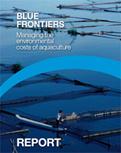 The Worldfish Center The Worldfish Center
Stephen J. Hall, Anne Delaporte, Michael Phillips, Malcolm Beveridge and Mark O’Keefe, Report
June 2011
This global review is a comprehensive analysis of global aquaculture production across all major species and farm production systems. The report aims to inform policy makers about the impacts of aquaculture on the environment and to stimulate debate on the optimal animal food production systems for tomorrow. |
|
The impact of integrated aquaculture–agriculture on small-scale farm sustainability and farmers’ livelihoods: Experience from Bangladesh
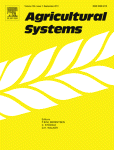 The Worldfish Center The Worldfish Center
Khondker Murshed-E-Jahana and Diemuth E. Pemsl
Agricultural Systems, Vol. 104, No. 5, June 2011, pp. 392-402
Research in Bangladesh shows that farmer training is a significant component for success in integrated aquaculture-agriculture (IAA). Intensification of agriculture often requires external inputs such as inorganic fertilizers and increased mechanization. These can have negative environmental effects and increase the risk for small-scale producers. IAA, on the other hand, promotes the use of on-farm waste products to increase ecological efficiencies through the synergistic effects of crop and fish production.
|
^ To the top
Commentaries and Other News Articles
Resolving Asia's Food Conundrum: Dual Strategy Needed
J. Jackson Ewing, Paul Teng and Marga Escaler, RSIS Commentaries, No. 106, 18 July 2011
Refugee Swap Deal: Will It Reduce Irregular Migration?
Harrison Cheng, RSIS Commentaries, No. 99, 7 July 2011
The End of the Line
Bryan Walsh, Time Magazine, 7 July 2011
Article features interview with Stephen Hall, Director General of the WorldFish Center.
Thai Elections: Time to Respect Democracy
Rizal Sukma, The Jakarta Post, 5 July 2011
Party Gamesmanship
Suhas Palshikar, The Indian Express, 30 June 2011
Asia's Food Security Conundrum
Paul Teng, J. Jackson Ewing and Margarita Escaler, RSIS Commentaries, No. 86, 1 June 2011
^ To the top |